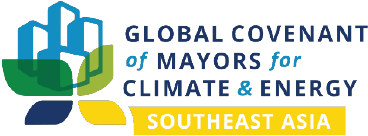On 18-19th of June 2020, IUC Asia Team hosted a virtual workshop on “Tagging Process for Climate Action Plans (CAPs) Development” with city officials from Palembang, one of IUC Asia’s pilot cities. The event was held over the course of two days to follow the national COVID-19 health protocols and was attended by around 20 participants representing local CSOs and numerous city council offices, namely the Environment Agency, District Planning Development Agency, Public Works and Spatial Planning City Office, Meteorology, Climatology, and Geophysical City Agency, and many more.
Climate change has progressively posed challenges to human survivability, especially within vulnerable communities, that it is instrumental to amplify adaptation efforts. On the other hand, development choices today have proven to be pivotal in improving the adaptive capacity of people and their governments well into the future. However, not many have noticed this link between the two; that in reality, a lot of current development policies, plans, and projects have yet to take climate change into account. There is also a lack of clarity among policy makers on how to effectively develop and integrate adaptation options. Therefore, IUC Asia envisions to address this gap. The two-day online workshop with Palembang City, in collaboration with IUC Asia’s technical partner in Indonesia, Center for Climate Risk and Opportunities Management (CCROM), aimed to enhance the city officials’ capacity in integrating climate adaptation actions into city development plans. Through this integration, cities would be well on their way to a more climate-resilient development in the future.
Ardiansyah, a representative from CCROM, introduced a four-step process to mainstream climate change into development plans in the workshop. First is to assess city’s climate vulnerability and risk by mapping their respective driving factors through an online tool developed by Ministry of Environment and Forestry of Indonesia, SIDIK. Ultimately, this assessment can identify hotspot locations which would act as the prioritized targets of city’s CAPs. The process is then followed by tagging – an identification and selection of existing programs and actions that do not only solve urban development issues, but also help combat the negative impacts of climate change. This is carried out through a scoring system, conducted by the related city officials, which would then generate lists of priority programs and actions that address these two issues simultaneously, from the most relevant to the least.
Eventually, the results of both processes above are combined on the third step, gap analysis. This procedure aims to analyse the gap between the ideal conditions and the current status quo, determining the course of actions to meet the development and climate target. At this step, all aspects of city programs are elaborated: what the actions are and where they would be conducted, fund availability and the urgency level, who are the stakeholders involved and how the monitoring and evaluation works. In the final stage, city programs and actions will be recalibrated and adjusted, further synchronized and synergized through Measurement, Reporting and Verification (MRV) efforts.
In this particular workshop, participants were given an in-depth tutorial to operate the adaptation program tagging matrix. The matrix lists out Palembang’s existing programs and actions, based on City Long-Term Development Plan, City Government Work Plan, and City Environment Status Report, which relevancy to solving development and climate change issues then would be measured by participants. To conclude, it was hoped that the workshop could further improve the capacity of local authorities in formulating local CAPs that integrate well with development strategies in achieving low carbon and resilient city.




